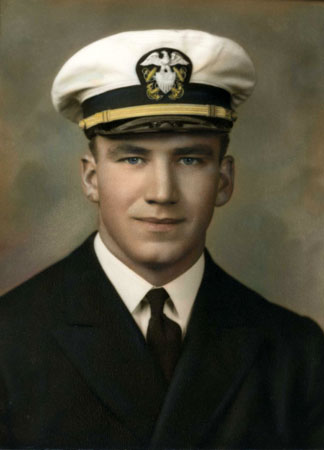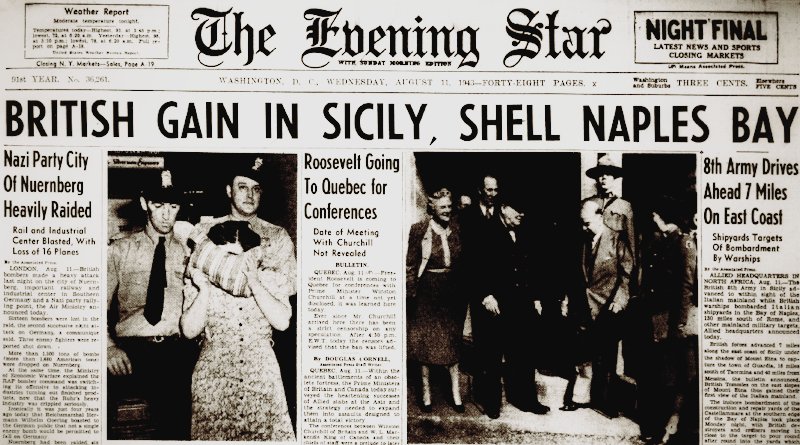World War II Chronicle: August 12, 1943
Click here for TODAY’S NEWSPAPER
Front page: Captain Clark Gable rode in the lead bomber during today’s raid into the Ruhr Valley. The actor filmed the action for a gunnery training film… Meanwhile, the Germans are evacuating Sicily under massive anti-aircraft cover…
On page three, American pilots discuss finding plenty of unused German warplanes abandoned on Sicilian air strips. As the warplanes are in good flying shape they figure the Luftwaffe is out of pilots… Page six reports that Capt. Arthur W. Wermuth, the “one-man army” of Bataan is alive and in a Japanese prison camp. Clark Lee wrote about Wermuth last February…
With German soldiers evacuating Sicily in large numbers, George Fielding Eliot says we should go ahead and invade Italy on page 10… Sports on page 16… On page 17, the Washington Redskins are scrimmaging in Camp Pendleton for the upcoming Shrine game. Sammy Baugh is stoved up with a bad back and three of the Redskins are about to hop a train to join the Armed Forces. One is Walter Haloupek, a two-time all-conference center at Cornell College before enlisting in the Naval Reserve last year. Haloupek becomes an ensign in the Navy and is killed when his submarine is sunk off the Philippines in 1944. He and his brother Don (a Marine) are both members of Cornell’s hall of fame…

On the same page, a war correspondent tells how elusive the Junkers Ju-88 reconnaissance planes can be. They are capable of operating at 40,000 feet and at that altitude the aircraft is invisible and you can’t hear them either.
Roving Reporter by Ernie Pyle
SOMEWHERE IN SICILY — Since Sicily was a new country for me I figured I might as well get sick right away and get it over with. So on my fifth day ashore they threw me into an ambulance and off we went hunting for a hospital.
We were looking for a certain station, and we couldn’t find it because it was moving forward while we were moving back, and we passed on different roads. The result was that the determined ambulance boys drove nearly halfway across Sicily before they finally gave up and started back. We drove a total of 75 agonizing miles over dusty gravel roads, and then found the hospital all set up and ready for business within four miles of where we had started from in the first place.
The clearing station was a small tent hospital, a sort of flag stop for the wounded on the way back from the lines. The first regular hospital was about 15 miles on back.
The average patient stays in the clearing station only a few hours at most. But once the doctors got a squint at me they beamed, rubbed their rubber gloves, and cried out: “Ah! Here is the medical freak we have been waiting for. We’ll just keep this guy and play with him a while.”
So they put me to bed on a cot, gave me paregoric and bismuth, aspirin and codine, soup and tomato juice, and finally wound up with morphine and a handful of sulfa-guanadine. The only thing I can say on behalf of my treatment is that I am well and hearty again.
My family physician in this case was Capt. Joe Doran, of Iowa City, Ia. Capt. Doran is a young and enthusiastic doctor who is different from most front-line doctors in that his main interest lies in treating sick soldiers rather than wounded ones. Capt. Doran likes to get at the seat of a man’s ills. In furtherance of this he has a nice little laboratory set up in one of the tents, complete with microscope and glass tubes. He is always taking specimens from his patients and then peering at them like Dr. Arrowsmith.
Captain Doran’s germ-quest upon me was somewhat agitated by the fact that upon the evening of my arrival he received a letter saying he had become a father for the second time, about six weeks previously. He was so overjoyed he gave me an extra shot of morphine and I was asleep before I could say “Congratulations.”
They kept me in what is known as a semi-comatose condition for about 24 hours, and then began to get puzzled. At first they thought I had dysentery, but the little laboratory showed no dysentery. Then they thought I had malaria, so they called in a couple of Italian malaria experts from down the highway. They chatted in English, punched my finger, took blood specimens, and reported later I had no malaria.
By that time I was getting better anyhow, so they decided that what I had was a noncomforming and just now fairly common illness which they call “battlefield fever.” With this you ache all over and have a very high temperature. The doctors say it is caused by a combination of too much dust, bad eating, not enough sleep, exhaustion, and the unconscious nerve tension that comes to everybody in a front-line area. You don’t die of battlefield fever, but you think you’re going to.
They put me in a corner of a tent, and in this corner at various times were three officers with similar fevers. Their illnesses were brief, like mine, and they all left before I did, so their families needn’t worry upon reading that they were ill.
One of my classmates was a red0headed and bespectacled lieutenant named Rahe Chamberlin, from Clarksville, O. Since coming into the Army Chamberalin has bought a half interest in a grocery store back home. Whenever they would bring us fruit juice in cans he would take a good gander to see if it was a product his partner was selling back home.
Another fellow-sufferer was Lieut. Richard Van Sycke, of Swearen, N.Y. He used to be in the automobile business at Perth Amboy. He is married to Clare Raftery, a delicious former Powers model, and he carries magazine-cover pictures of her in his map case.
The third was Major Ellsey Brown of Okmulgee, Okla. Major Brown used to be a president and general sales manager of the Cleveland Tractor Co. He is a tough outdoorsman and he was so thoroughly disgusted at getting sick that it made hime even sicker. He celebrated his 44th birthday just before entering the hospital.
Major Brown distinguished himself in our midst by paying a flat hundred ollars to the station’s chaplain for a $14 air mattress. His own gear was all lost in the original Sicily landings, and, as he says, money means nothing over here anyhow so why not pay a hundred dollars for something that will help a little?
Evening star. (Washington, D.C.), 12 August 1943. Chronicling America: Historic American Newspapers. Lib. of Congress.
https://chroniclingamerica.loc.gov/lccn/sn83045462/1943-08-12/ed-1/
